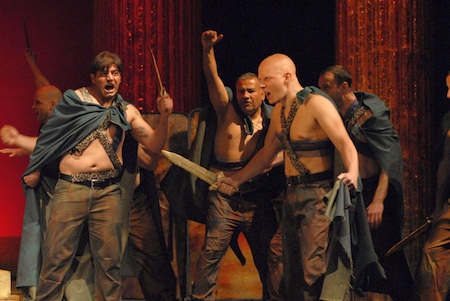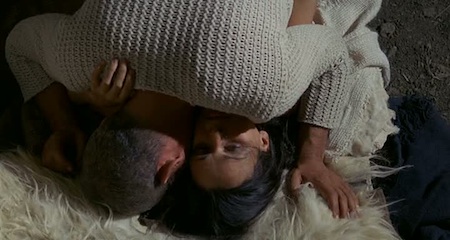In the explosion of fresh cinematic voices that came with the 1960s, few countries were louder or more celebration-worthy than Italy—which had already claimed the honor of being first to shake off post-WWII doldrums with its neorealist movement.
It’s hard to accept that that rebellious generation might grow old and grey like any other, but time waits for no director. Lina Wertmuller has slowed down to the occasional TV movie. Bernardo Bertolucci lost prime years to an incapacitating back condition. Still others have retired or passed away. The last Sixties Italians still working at full strength are Marco Bellocchio and the Taviani brothers (Paolo and Vittorio), who’ve premiered new films within recent months while well into their seventies and eighties, respectively.’
The Tavianis’ Ceasar Must Die just opened theatrically in the U.S. after making the festival rounds. With its concept both simple and unusual, it’s very much of a piece with the half-century body of feature work that preceded it.
Deliberately blurring the line between documentary and fiction, the Berlinale Golden Bear winner is populated entirely by prisoners and guards in the high-security wing of Rome’s penitentiary Rebibbia. The siblings set up shop there for six months, recording the process as theater director Fabio Cavalli selects prisoners to act in his latest in-house production, an activity that the inmates are clearly familiar with and psyched to participate in. (The movie is framed by sequences of the cons being led back to their cells after a final performance—shots meaningless the first time around, but profound at the end, as we’ve realized how deadening their routine will be now be once again without the imaginative escape of playmaking.)
Their text this time is Shakespeare’s Julius Caesar. That tale of power, corruption and betrayal clearly speaks to men who’ve lived by criminal codes both inside and outside lockup. But as the rehearsals go on, the play seems to take over the men, and the institution itself, until we can’t tell what’s “staged” or not—least of all when the inmates are purportedly being “themselves.”
An elegant formal experiment in crisp black-and-white, its lack of fuss underlined by a running time of just seventy-six minutes, Caesar Must Die finds the Tavianis as curious as ever about specific social orders, observing this one with the same grave yet supple dispassion their films sported from the beginning. If they’ll never be as famous as a Fellini or Antonioni or Visconti, it’s because a certain self-abnegating modesty is built into their work. Their cinema is no cult of personality.
Yet it’s a diverse, idiosyncratic, unpredictable (even now) body of work, all the more so because they’ve often been a bit too simplistically held up as latterday torch-bearers of the neorealist tradition—after all, they were purportedly first inspired to become filmmakers by seeing Roberto Rossellini’s 1946 classic Paisan in their youth. The sons of a lawyer who’d suffered under Mussolini for anti-fascist sentiments, the Tuscan brothers naturally gravitated toward politically informed endeavors—experimental theater, film criticism, journalism—during their Pisa university days and beyond, working into the movie industry via shorts and crew jobs until they made their shared feature directorial debut in 1962.
Their first two features were co-directed with longtime friend Valentino Orsini (who would ultimately prove most influential as a documentarian and teacher). A Man for Burning/Un uomo da bruciare provided an early starring role for future Italian superstar (and vocal radical leftist) Gian Maria Volonte as real-life Sicilian union organizer Salvatore Carnevale, murdered at age 32 in 1955. After the next year’s episodic comedy Outlaws of Love, the brothers made their “solo” feature debut wth 1967′s The Subversives/I sovversivi, which wove together four separate narratives toward a more serious critique of discord within Italy’s progressive political factions.
They won more attention two years later with Under the Sign of Scorpio/Soto il segno dello scorpione, which also starred Volonte—who in the interim had become an international name thanks to Sergio Leone’s “spaghetti westerns.” (Which also benefitted a hitherto minor American actor named Clint Eastwood.) But he hardly dominates a movie that—like so many of the Tavianis’—is primarily about community. It’s a striking parable about what happens when the residents of one isolated island society are forced to join another as refugees after fleeing a volcanic eruption. Rather than integrating themselves as grateful guests, the newcomers become aggressive would-be conquerors, until peace can only be restored by violent reprisal. Ripe with the experimentation and revolutionary critique of so much late 1960s/early 1970s cinema, Scorpio indicts mankind’s warring nature as if The Lord of the Flies‘ protagonists had grown up but gone even more feral.
These key early works—nearly impossible to see in North America for decades—are well-represented on Fandor, which offers pristine restorations of A Man for Burning, The Subversives and Scorpio. But despite worthy subsequent features (1972′s Tolstoy-adapted St. Michael Had a Rooster, 1974′s starry political costume drama Allonsanfan with Marcello Mastroianni), the brothers lacked an international breakthrough until a humble 1977 project originally made for Italian TV. Padre Padrone was one of their starkest, seemingly least commercial films, portraying the brutalization of a Sardinian shepherd boy by his unthinkingly cruel father, and the son’s adult rebellion. A story of self-education (and liberation), it won awards at both Berlin and Cannes, a rare bonanza.
Suddenly the Tavianis were a big deal. They responded with typical eccentricity: 1979′s Il Prato (advertised as “from the director of Padre Padrone,” as if the brothers had become a single biological entity) was a visually ravishing curio of utopian idealism that launched Isabella Rossellini’s acting career. The Night of the Shooting Stars (1982) and English-language Good Morning, Babylon (1987) used magic realism to more successful commercial than artistic ends. Elsewhere they adapted Pirandello (Kaos), Goethe (Elective Infinities with Isabelle Huppert), Tolstoy again (Night Sun), and again (Resurrection), Pirandello again (You Laugh), and Dumas (2004′s Luisa Sanfelice). So much for the theory that these guys are neorealist diehards. They’re classicists, albeit with feet on the ground. They know that what keeps classic literature real is its basis in the creative mindset’s originating era of psychology. A lesson that seems lost on more recent cinematic interpretors of Tolstoy, to say the least. (Nobody seems to be competing to re-interpret Pirandello, alas.)
Like so many sibling artistic acts, the Tavianis remain an intriguing mystery—we puzzle over them as we might “identical” twins. (Yet they were born years apart, Vittorio in 1929 and Paolo in 1931.) They’ve done little publicity-wise to separate their individual identities over the years.
Yet their confessed process is startling to grasp: The brothers take turns directing scenes, each observing without comment as the other takes control. How could this not result in artistic schizophrenia, let alone fraternal in-fighting? Maybe they’re like the prisoner-actors in Caesar Must Die—trapped in an institution they can’t escape, but must make the best of. Or maybe they’re brothers who’ve simply been on the same page since they were old enough to recognize one another as twin souls.





